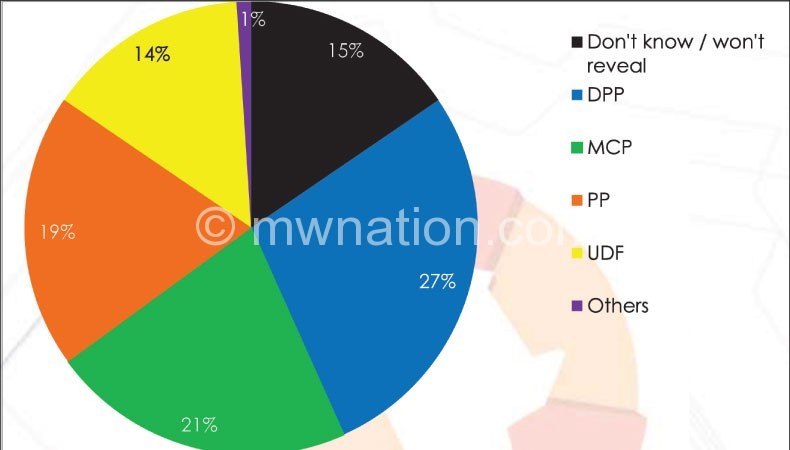Poll says Peter leads, but race still tight
 Democratic Progressive Party (DPP) presidentialcandidate Peter Mutharika has a slight lead in the US-based Afrobarometer opinion poll released Friday night, but the survey’s other finding that 1.2 million voters or 15 percent are still undecided could give the law professor some pause as they essentially make the election a three-horse race.
Democratic Progressive Party (DPP) presidentialcandidate Peter Mutharika has a slight lead in the US-based Afrobarometer opinion poll released Friday night, but the survey’s other finding that 1.2 million voters or 15 percent are still undecided could give the law professor some pause as they essentially make the election a three-horse race.
In the poll, Mutharika commanded 27 percent of the vote followed by Lazarus Chakwera of Malawi Congress Party (MCP) and President Joyce Banda of the ruling People’s Party (PP) at 21 and 19 percent, respectively.
Youthful United Democratic Front (UDF) leader Atupele Muluzi came fourth with 14 percent.
The poll was conducted between March 23 and April 7 2014 with a sample size of 2 400.
According to Afrobarometer, the sample was drawn randomly based on probability proportionate to population size (PPPS), thus taking account of population distributions across regions, rural-urban location and gender. The sampling process, according to the survey summary, ensures that every adult Malawian citizen has an equal and known chance of being selected in the sample.
The survey has a margin of error of plus or minus two percent at a 95 percent confidence level and used face-to-face interviews conducted in the language of the respondents’ choice.
However, statistician and associate professor at the University of Malawi’s The Polytechnic Salule Masangwi said the percentage of undecided voters should worry DPP and keep the two close candidates hopeful.
“Statistically, with a + or – 2 percent margin of error if the elections were to be held on the day the survey was conducted, the DPP would have gone into government. However, looking at the undecided voters, that must be a cause for worry for the DPP and perhaps hope for the MCP as well as PP because the 15 percent could go their way, too,” he said.

Indeed, one of Afrobarometer’s leading pollsters, Boniface Dulani, told Nation on Sunday yesterday that with 15 percent of voters undecided, the poll is a three-horse-race among Mutharika, Chakwera and Banda. Anyone of the three, he said, can win the race.
“Opinion polling is not exact science and also changes quickly. This survey was conducted somewhere between March and April, it is almost a month since fieldwork was completed. But Afrobarometer’s credibility has been earned over time and there is no doubt that we stand by our findings,” he said.
Nonetheless, Dulani said since the survey was conducted, the intensity of campaign among the top political parties has picked up, a development he said may have also swayed the undecided voters and changed the statistics after the poll.
“So, we are saying as of now, the election is too close to call because if you factor in the 15 percent undecided vote, it means that among the top three candidates, Mutharika could basically get anything between 25 and 40 percent, Chakwera could have between 19 and 38 percent whereas Joyce Banda could muster between 17 and 36 percent of the votes.
“So the potential maximum share of the votes, assuming that the 15 percent goes to the top candidates, then either of them could win, but Atupele is clearly out of the equation,” he said.
Over the last few months, London-based Economist Intelligence Unit (EIU), Malawi’s Research Tech Consultants and local online news site Nyasa Times have also conducted their own opinion polls which have highly favoured President Banda to win the forthcoming elections. The most controversial one was Research Tech’s—with a sample size of 3 883 and a margin of error of 3.6 percent—which gave President Banda a double digit lead. In that poll, Banda was ahead by 42 percent, followed by Chakwera at 23 percent, Mutharika at 22 percent and Muluzi at 10 percent. Opposition parties trashed this poll as bogus. Yesterday, we were unable to get comments from the four leading parties.
About Afrobarometer
The Afrobarometer, a collaboration of social scientists from 35 African countries, is an independent, non-partisan research project that measures the social, political, and economic atmosphere in Africa.
Coordination is provided by the Centre for Democratic Development (CDD-Ghana), the Institute for Justice and Reconciliation (IJR) in South Africa, the Institute for Development Studies (IDS) at the University of Nairobi in Kenya, and the Institute for Empirical Research in Political Economy (IREEP) in Benin with technical support from Michigan State University (MSU) and the University of Cape Town (UCT).
Afrobarometer Round Six, under which the Malawi elections poll was conducted, is receiving financial support from the UK’s Department for International Development (DfID), the Mo Ibrahim Foundation, the Swedish International Development Agency (Sida), the United States Agency for International Development (Usaid) and the World Bank.





